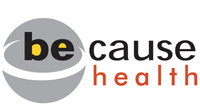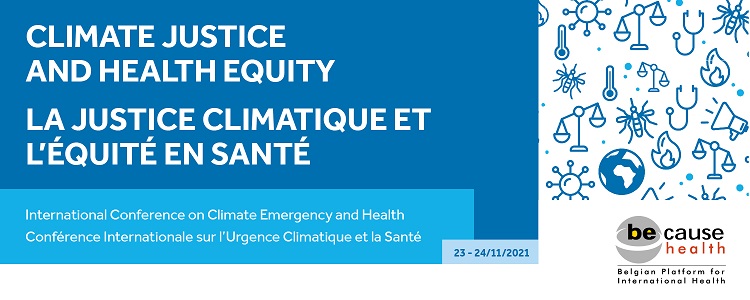PROGRAMME
Moderator: Annabelle Van Nieuwenhuyse (Belgium)
23 November 2021: WHAT IS IT ABOUT? PERCEPTION / CLIMATE IMPACT
Plenary 1
- 10:00 am: Welcome and introduction to the programme, by Magalie Schotte (Coordinator Be-cause health, Belgium)
- 10:10 am: Opening testimony, by Bob Matovu (Fridays for the Future, Uganda)
- 10:20 am: Setting the scene: a Planetary Health perspective on the climate crisis, by Sabine Gabrysch (Potsdam Institute for Climate Impact Research & Charité – Universitätsmedizin Berlin, Germany):
Human health fundamentally depends on functional ecosystems and a stable climate – this is what ‘Planetary Health’ is about. So how is planet Earth doing? What does this mean for us? And above all: what can we do? A diagnosis of our planetary crisis with starting points for healing humans and planet.
11:00 am Coffee break: Photo essays capturing the Interconnectedness of Global Food Systems and Climate Change, by Sara Dada (University of Dublin, Ireland)
Plenary 2
- 11:15 am: Impact of Climate Change on Infectious Diseases, by Steven Van Den Broucke (Institute of Tropical Medicine, Belgium): The impact of climate change on infectious disease is complex and multifactorial. Specific examples will discuss the impact of temperature, precipitation, drought, humidity and wind on vector-borne diseases as malaria and dengue, together with other specific examples. Predictions from past models will be discussed.
- 11:45 am: Feedback on the results and challenges of the COP26, by Beverly Longid, International Indigenous Peoples Movement for Self-Determination and Liberation (IPMSDL), Philippines
12:00: Lunch break – online footage
1:00 pm: Thematic session 1 – Food security
- Impact du changement climatique sur la santé des populations riveraines : Cas du Village du Bondanga, dans la Zone de santé de Bokongi (RDC), by Juste Momboto Mosoko (Memisa, DRC)
- Nutrition and health as outcome indicators of an integrated and climate sensitive programme: economic development and pastoralism in Tanzania, by Mathias Lardinois (Enabel, Belgium)
- Indigenous Peoples on Sustainable Food Systems and Right to Self-Determination, by Beverly Longid (International Indigenous Peoples Movement for Self-Determination and Liberation (IPMSDL, Philippines)
- Moderated by Jean Clovis Kalobu (Memisa, DRC)
2:00 pm: Thematic session 2 – Sexual and Reproductive Health and Rights
- Climate Migration and Sexual and Reproductive Health: A Scoping Review, by Kim Van Daalen (University of Cambridge, UK)
- Intersections between climate change and female genital mutilation among the Maasai of Kajiado County, Kenya, by Tammary Esho (Centre of Excellence for Female Genital Cutting/Mutilation (FGM/C), AMREF Health Africa)
- Greening the health system for maternal and newborn health lessons from Bungoma County, Kenya, by Gladys Ngeno (Options, Kenya)
- Moderated by Marlies Casier (Sensoa, Belgium)
3:00 pm: Coffee break: Photo essays capturing the Interconnectedness of Global Food Systems and Climate Change, by Sara Dada (University of Dublin, Ireland)
3:15 pm: Thematic session 3 – Health & Heat (global)
- Short-term exposure to temperature and all-cause and cause-specific mortality: a study in nine Belgian cities, by Claire Demoury (Sciensano, Belgium)
- The impact of Climate Change on Health in the Netherlands, by Jeffrie Quarsie (GGD Rotterdam – Rijnmond, the Netherlands)
- The experience of heat stress among pregnant and postpartum women and their neonates in Burkina Faso and Kenya: a qualitative analysis, by Fiona Scorgie (University of the Witwatersrand, South Africa)
- Moderated by Elies Van Belle (Be-cause health/Memisa, Belgium)
Plenary 3
- 4:15 pm: Student panel discussion with observations and wrap up of the day. Panellists: Aminata Bagayoko (ITM, Antwerp), Tonga Calvin (ITM, Antwerp), Riddhi Patel (ITM, Antwerp) and Gabriel Manzi (ULB-UClouvain). Moderated by Karel Gyselinck (Enabel, Belgium)
- 4:50 – 5 pm: Closure by Elies Van Belle (Chair Be-cause health, Belgium)
24 November 2021: WHAT CAN BE DONE? PERCEPTION / OPPORTUNITIES
Plenary 4
- 10:00 am: Welcome by Elies Van Belle (Chair Be-cause health, Belgium)
- 10:10 am: Setting the scene: Engaging with how to achieve healthy societies: insights from India, Latin America and East and Southern Africa, by Rene Loewenson (Training and Research Support Centre, Zimbabwe):
A dominant ‘global’ view can dominate over, mask and undermine significant differences in thinking about healthy societies and the drivers of the conditions for health in different regions. There is growing articulation of diversity and longstanding debates in how we think and act on healthy societies. The lens of three different regions help to show this and the implications for action, including for responding to threats posed to health by climate change, the damage to ecosystems and pandemics.
11:00 am: Coffee break: Photo essays capturing the Interconnectedness of Global Food Systems and Climate Change, by Sara Dada (University of Dublin, Ireland)
Plenary 5
11:30 am: Setting the scene: Climate justice and health equity “Two Communities Struggle for Climate Justice”, by Virginia Talens (Climate Change Network for Community Initiatives, Philippines):
The presentation is about two peasant communities in a valley located North of Manila which were inundated by typhoons Goni and Vamco during the last quarter of year 2020. An organization of peasant women called AMIHAN gathered their strength and moved to rehabilitate their farms and rise from the devastation. The Climate change Network for Community-based Initiatives or CCNCI assisted in providing climate change education and training. The women’s group gave an overwhelming response to the training challenge and moved to act not only to secure their food and farms but also to seek justice for a tragedy that is climate change and all that aggravated its effects–quarrying, mining, chemical farming, failures of governance , a fascist rule included. Their story and struggle has its victories but the journey has just begun. It is their resolve to continue.
12:00: Lunch break – Climate poets live, Seckou and Marjan De Ridder
1:00 pm: Thematic session 4 – Transformative communities
- Women-led climate justice: Building resilience to a global health disaster, by Nicolette van Duursen (Ipas, the Netherlands) & Jorge Matine (Ipas, Mozambique)
- Community Based Health Programme as health Adaptive Strategy in Climate Emergencies, by Rhoda Dalang (Center for Development Programs in the Cordillera, Philippines)
- Brussels Health Gardens: potential of participatory research method to co-create urban healing spaces, by Vitalija Povilaityte – Petri (University of Mons, Belgium)
- Moderated by Willem van de Put (ITM, Belgium)
2:00 pm: Thematic session 5 – Transformative policies
- Climate Emergencies: Opportunities to invest in Health Security by Michel Jancloes (Health & Climate Foundation, France)
- Can a climate lens improve humanitarian response to floods? Preliminary results of an analysis by Médecins Sans Frontières “Flood preparedness and response in Pibor, South Sudan”, by Rob D’Hondt (MSF, Belgium)
- Climate change and improving access to drinking water and population health: the case of Mozambique, by Laurence Janssens & Akila Munir (Enabel, Belgium)
- Building a caring world beyond growth – The need for a care-full degrowth transformation for planetary health, by Winne van Woerden (Commons Network Foundation, the Netherlands)
- Modéré par Michel Jancloes (Health & Climate Foundation, France) & Davide Ziveri (Humanity & Inclusion, Belgium)
3:00 pm: Coffee break: Photo essays capturing the Interconnectedness of Global Food Systems and Climate Change, by Sara Dada (University of Dublin, Ireland)
3:30 pm: Thematic session 6 – Transformative health systems
- Operationalization of the “One Health” concept through a community assessment, by Louisa ben Abdelhahfidh (Médecins du Monde, Belgium)
- One Health pour renforcer la résilience des communautés rurales, by Issa Ilou (Vétérinaires sans Frontières, Niger)
- Les organisations mutualistes comme acteurs de la lutte contre (les conséquences de) l’urgence climatique, by Laure Speecke (Christian Mutualities, Belgium) and Issa Sissouma (Union Technique de la Mutualité Malienne)
- Moderated by Carlos Mediano (Medicus Mundi International, Spain)
Plenary 6
- 4:30 pm: Video message ‘The climate emergency, its impact to health and health equity and the urgency to act now’ by Mike Ryan (WHO)
- 4.35 pm: International panel discussion and Q&A with interactive information sharing: How can the global health movement contribute to the climate movement? How can we get health higher on the agenda of the climate movement? Panellists: Elies Van Belle (Be-cause health), Adélaïde Charlier (Youth for Climate), Carine Thibaut (Climate Coalition/Greenpeace), Elham Youssefian (International Disability Alliance) and Virginia Talens (Climate Change Network for Community Initiatives, Philippines. Moderated by Karel Gyselinck (Enabel, Belgium)
- 5:00 pm Conclusions and wrap up of the day by Xavier de Béthune (Steering group Be-cause health, Belgium)
- 5:10 pm: Final speech by Meryame Kitir, Belgian Minister of Development Cooperation and Major Cities Policy
- 5:20 – 5:30 pm: Closure by Magalie Schotte (Coordinator Be-cause health)

